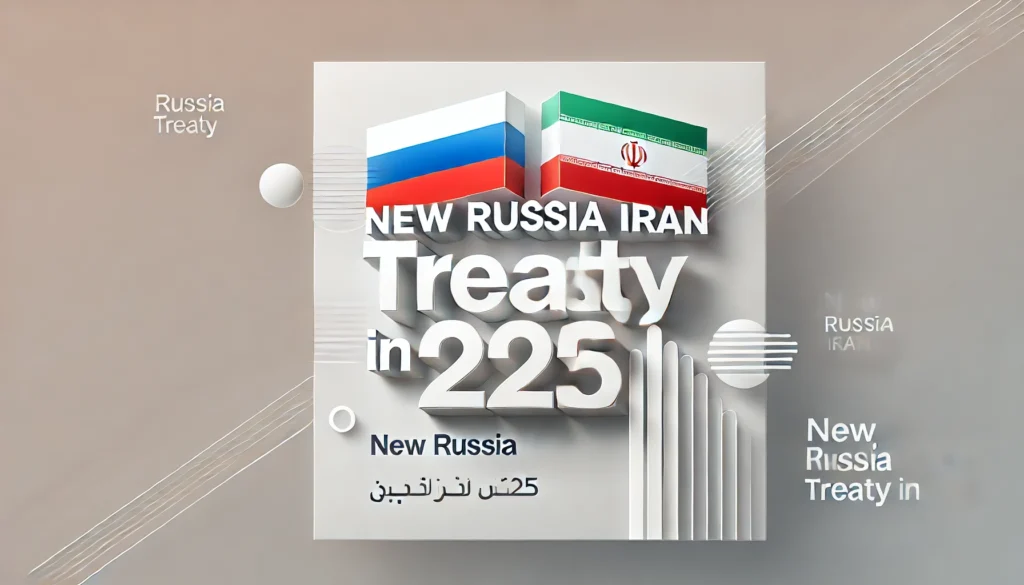
Today is January 18 , 2025 and you are going to get in this article some good info about Russia Iran treaty and its implications.
As per Reuters Russia and Iran have signed a 20-year partnership agreement to deepen their defense and strategic ties. This treaty signifies enhanced collaboration in areas such as military cooperation, energy, and trade, reflecting a shared interest in countering Western influence. The deal underscores a growing alignment between Moscow and Tehran in response to global geopolitical tensions.
Details about the Russia – Iran Treaty :
Russia and Iran have signed a 20-year agreement strengthening defense ties, including military drills, security cooperation, joint officer training, and warship port visits. The treaty ensures neither nation will allow its territory to be used against the other or aid aggressors attacking either party. They will collaborate to address military threats, reinforcing their partnership against external pressures. This pact highlights their shared commitment to bolstering security and countering geopolitical challenges.
Russian President Vladimir Putin emphasized reducing bureaucracy and taking action despite Western sanctions. He stated that Russia informs Iran about developments in the Ukraine conflict and consults on Middle Eastern and South Caucasus events. Both nations, former allies of Syria’s Assad regime, deny their ties target other countries, despite accusations of Iran supplying weapons to Russia for Ukraine. Their cooperation underscores a shared strategic focus amid growing Western pressure.
Importance of The Russia – Iran Treaty :
- The Russia-Iran defense pact comes amid shifting dynamics in Syria, where rebel forces have gained more control following the recent ousting of Syrian President Bashar al-Assad. The agreement reinforces Moscow and Tehran’s alliance as they adjust to the changing landscape, maintaining influence in Syria while addressing Western sanctions and accusations of military collaboration. This timing highlights their strategic coordination to protect shared interests in the region despite external pressures.
- The new Russia-Iran treaty aims to enhance regional stability and peace in the Middle East, particularly following Syria’s liberation. While not intended to directly threaten U.S. allies, the agreement focuses on bolstering cooperation between Russia and Iran to address common challenges, including security and geopolitical shifts. Their growing alliance reflects a shared goal to maintain influence and peace in the region amidst external pressures.
- Russia is seeking to strengthen its position in the Middle East, and for Iran, this treaty can be a significant step towards regional stability. The agreement not only deepens military and strategic ties between the two nations but also enhances Iran’s position within the region, especially following the shifting dynamics in Syria. This partnership could contribute to balancing regional power and reducing external tensions.
International Effects of The Russia Iran Treaty :
- While the Russia-Iran treaty aims for long-term peace and regional stability, it may not pose a significant immediate threat to the U.S. The U.S. has long been concerned about Iran’s influence, but this treaty mainly solidifies defense cooperation and strategic alignment between Russia and Iran. For the U.S., it likely reinforces concerns about Iranian activities, but the pact is more about strengthening the Russia-Iran alliance than directly challenging U.S. interests.
- The Russia-Iran treaty, aimed at regional stability, could be seen as a challenge for Israel, which closely monitors developments in the Middle East. Israel remains cautious about Iran’s increasing influence, particularly in defense and military cooperation with Russia. The treaty could intensify Israel’s concerns, especially regarding Iran’s role in regional conflicts and its support for groups hostile to Israel. As such, Israel is likely to keep a close watch on the evolving relationship between Russia and Iran.
Russia Iran Treaty might not be an Immediate Challenge for USA :
The Russia-Iran treaty primarily focuses on strengthening their bilateral relationship in areas like military cooperation, energy, and trade, especially in the context of their shared interest in countering U.S. influence in the Middle East. The treaty could contribute to geopolitical stability by forming a strategic alliance in the region.
For U.S. allies, the treaty might not immediately pose a direct challenge, but it can influence regional dynamics, especially in areas like the Syria conflict and nuclear proliferation concerns. U.S. allies in the Middle East, such as Israel and Saudi Arabia, may see it as a shift in the balance of power, but they are already accustomed to managing tensions and conflicts in a volatile region.
It could also put pressure on countries like the U.S. to adjust their strategies in response to the growing alignment between Russia and Iran. However, as of now, this alliance doesn’t seem poised to immediately disrupt the stability or alliances of the U.S. on a broader scale.
Conclusion :
Concluding this article I would like to present some key implications of the Russia – Iran deal.
Key Implications of Russia Iran Deal 2025 :
- Military Cooperation: Enhanced military ties may include arms deals, joint exercises, and intelligence-sharing, which could alter the security dynamics in the Middle East and beyond. This is especially relevant given Iran’s role in the region and Russia’s global ambitions.
- Economic Partnership: The partnership could also help Iran circumvent Western sanctions by leveraging Russian resources and networks. Similarly, Iran could provide Russia with support amidst its own challenges stemming from international sanctions.
- Western Concerns: For the West, this alliance may heighten worries about regional instability, especially in hotspots like Syria and Iraq, where both Russia and Iran have significant influence. There may also be concerns about the potential for increased arms proliferation.
- Geopolitical Significance: The treaty underscores a shift towards a multipolar world order, with countries like Russia and Iran seeking to challenge U.S. dominance and create alternative centers of power.
While this partnership may not immediately disrupt the strategic interests of U.S. allies, its long-term implications could reshape alliances and rivalries. Countries like Israel, Saudi Arabia, and other Gulf states may feel increasingly uneasy about the bolstering of Iranian capabilities.
I hope you like the article
